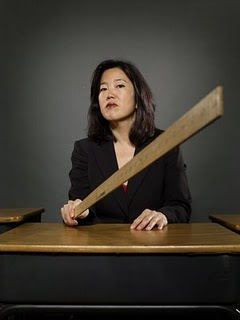Teacher Town Hall Focused More On Tests Than Students

“This event is not about education reform, it’s about Michelle Rhee,” said David Goldberg, a union leader for United Teachers of Los Angeles and an elementary school teacher. “If she really wanted to talk to the teachers’ unions, she would come to us, not attack teachers.”
Rhee, the former chancellor of Washington D.C.'s public schools, expressed her chagrin in her opening remarks at the protestors' criticism.
“I wish those people outside would have come inside, to be a part of this discussion," she said.
The scene was set for the first installment of a three-city event, dubbed “Teacher Town Hall,” which brought together Rhee and two other education experts, former D.C. union leader George Parker and founder and principal of Capital Preparatory Magnet School Steve Perry.
Organized by StudentsFirst, an education nonprofit Rhee founded in 2010, the event also attracted over 200 teachers to discuss the state of K-12 education in the U.S.
Best known for championing the use of standardized test scores to evaluate teacher performance, and the district-wide cheating scandal that took place under her watch on those same tests in 2011, Rhee quickly rebuffed the notion she was “anti-teacher,” citing educators as the most significant factor in classroom quality.
Still, she refused to let poor performing teachers off the hook.
"We cannot afford ineffective teachers," said Rhee, famous for her hard-line stance on firing teachers whose students' scores were not up to par.
While many attendees approved the termination of incompetent teachers, little was discussed regarding what constituted a "failing teacher" or a "failing school" other than low test scores.
A major complaint among audience members was the emphasis on standardized test scores, which some claimed held no risk or incentive for students, but largely determined the fate of educators. Teacher evaluations under Rhee's model were half based on students' scores and the rest on administrative observations.
Though Rhee argued for the value of standardized testing to assess student performance, Perry acknowledged the tests' lack of usefulness in the day-to-day running of schools.
“We just got last year’s test scores back, and we’re already eight weeks into the new school year,” he said. “And in Connecticut they don’t get tested again after 10th grade...what we need is regular, say every two weeks, chunks of standard test-like information to see how the kids are doing.”
The one issue the panelists agreed upon was today's oft-cited "achievement gap" in education.
"If everyone's running at the same pace and you're two years behind the pack, when are you ever going to catch up and close that gap?" Parker asked.
"The school week is not Monday to Friday, seven to three. It's whatever it takes, as long as it takes," agreed Perry.
Noticeably lacking in the debate was talk of curricula or any concrete alternatives to standardized tests in assessing student performance, like project-based learning. The role of chronic school underfunding also went unmentioned, despite California's 49th rank among states in per-pupil spending.
Education policy solutions were also vague. All three panelists expressed support for some kind of voucher, but questions surrounding the diversion of funding from public schools to charters were glossed over.
"It's about good or bad schools, not public or private," said Perry.
Talk of resources for public schools was salved with the statement that more money did not mean a better quality education.
But Rhee conceded the current public school system suffered from a “bloated bureaucracy” that allocated more funds to central office employees than to resources for students.
Still, lack of resources and student poverty in public schools were rejected as valid reasons for underperformance. Cleverly sidestepping a union teacher’s question regarding higher test scores in wealthier areas, Perry pronounced that one’s "birth is not [one’s] destiny" and that education was the only way out of poverty.
Rhee spoke frankly. “Does poverty make it harder to get to school every day, when you haven’t had a meal, or do your homework when the lights are out at home? Yes. But it does not affect that teacher getting up in front of that classroom every day and doing their job during school hours.”
Other discussion topics included the role of parents, which Perry said was needed at the negotiating table during union contract agreements, and teacher unions whose contracts had gone too far, according to Parker.
“My job is to protect your rights, not your wrongs,” Parker said to union members.
The Teacher Town Hall tour continues to Birmingham, Ala., on September 12, and to Philadelphia on September 16.
Join the Teacher Town Hall conversation on Twitter here.
Reach Reporter America Hernandez here or tweet her at @america_hdz.



